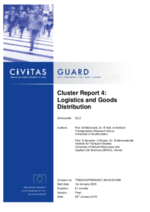Toolbox for freight initiatives
Thematic areas
Urban logistics
Summary
The aim of the measure was to create an alternative concept for goods distribution with a smaller environmental impact, improving quality of life in the city of Genoa.
Implementing sustainable mobility
With the general objective of confronting the high levels of congestion and pollution generated by freight distribution in the city, the aim of the measure was to optimise collection and delivery services through a toolbox of coordinated initiatives. These included:
- the establishment of a mobility credits system, limiting the access of freight vehicles to the target area on the basis of payment of a predetermined amount of mobility credits previously distributed by the public administration to all economic activities in the area;
- the creation of one or more small proximity warehouses for the temporary storage of small quantities of goods in order to discourage traders to use their own vehicles to transport goods;
- the rationalisation of vehicle use by traders through the introduction of a van-sharing service; and
- the elaboration of coherent regulations for commercial vehicle access to target areas.
Progress
Data on existing commercial activities in the historical city centre were collected and analysed. The scheme was then developed with the participation of local stakeholders (shopkeepers, artisans, transport associations).
Outcomes
The van-sharing service proved successful, with fewer commercial vehicles entering the target area and less road congestion. However, following the testing of the mobility credits concept, a need was identified for further research, especially into the technological support systems.








